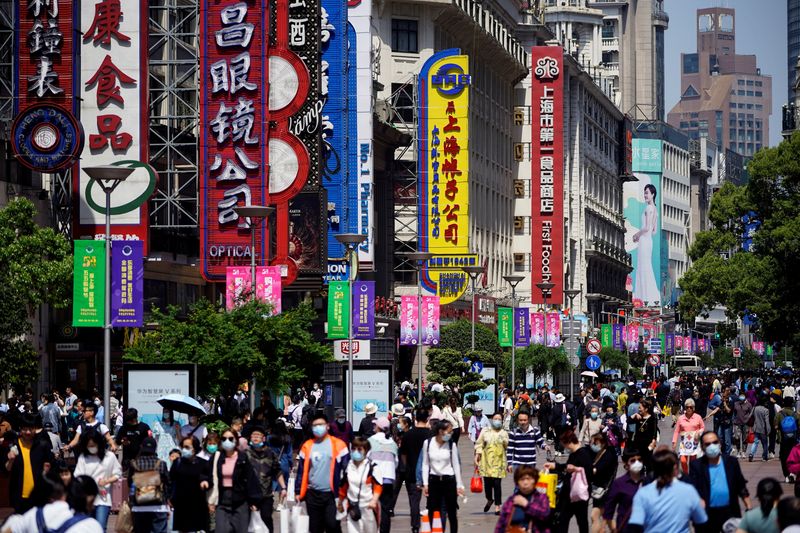BEIJING (Reuters) - China's consumer prices rose at a slower-than-expected pace in August while the rate of producer inflation hit an 18-month low, reflecting an economy plagued by weak domestic demand and leaving room for further central bank policy easing.
The consumer price index (CPI) increased 2.5% from the same month a year earlier, National Bureau of Statistics (NBS) data showed on Friday, slower than 2.7% in July and the 2.8% average forecast in a Reuters poll of analysts.
The producer price index (PPI) rose 2.3%, the slowest pace since February 2021, and slower than 4.2% a month prior and 3.1% in the poll, due to falling energy and raw materials prices.
"Factory gate inflation is set to fall further throughout the rest of the year thanks to a continued drop back in commodity prices and a higher base for comparison," Capital Economics analysts Sheana Yue and Zichun Huang said in a research note.
"We think CPI inflation will remain below the PBOC's 3% ceiling," they said, referring to the People's Bank of China (PBOC).
Official and private data indicates further lost momentum in August in the world's second-biggest economy, where property market weakness, COVID-19 containment measures and power shortages have dented consumption and factory activity.
There were 1,404 new COVID-19 infections in China on Sept. 8, 301 of which were symptomatic, the National Health Commission said, while Chengdu has extended a lockdown for the majority of its over 21 million citizens.
Slower growth in consumer prices came as food prices rose 6.1% on year in August, versus 6.3% in July, with non-food items at 1.7% from July's 1.9% rise.
Core CPI, which excludes volatile food and energy prices, rose 0.8%, matching the previous month.
On a month-on-month basis, the CPI fell 0.1% from July, after rising 0.5% in July from June, and compared with 0.2% forecast in the Reuters poll.
Overall industrial products prices maintained a downward trend due to falling prices in global crude oil and non-ferrous metals, NBS said separately.
Producer price inflation in oil and natural gas extraction slowed to 35.0% on year in August from 43.9%.
On month, the PPI fell 1.2% in August from July, when it declined 1.3% from June.
While consumer inflation was approaching the government's target of around 3.0%, it was still lower than seen in other major economies.
The PBOC in August said China faces rising structural inflation pressure and consumer inflation might exceed 3% in some months in the second half of the year.
Analysts said slowing inflation could give some room for further monetary policy easing.
"As such, the PBOC will not be constrained to ease policy further to support economy," said Yue and Huang. "The PBOC had lowered most policy rates in August, and we continue to anticipate more policy rate cuts during the rest of the year."

China's cabinet announced more steps on Thursday to spur investment, state media reported, extending a raft of measures to bolster an economy ravaged by COVID-19.
"We expect further easing will come in the form of quantity-based tools to provide liquidity support as well as structural tools like additional re-lending quotas for focus areas like manufacturing and green investment," said HSBC economist Erin Xin.